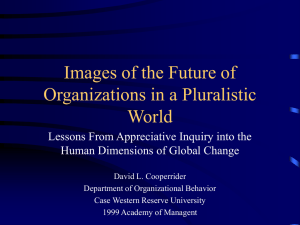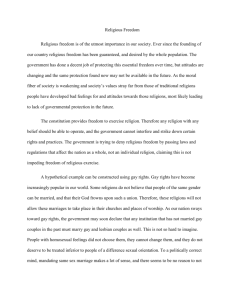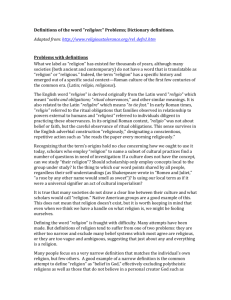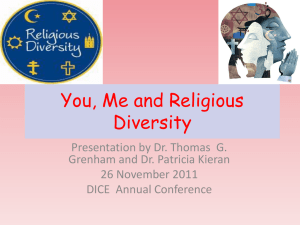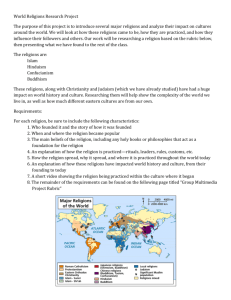Chief Justice`s speech
advertisement
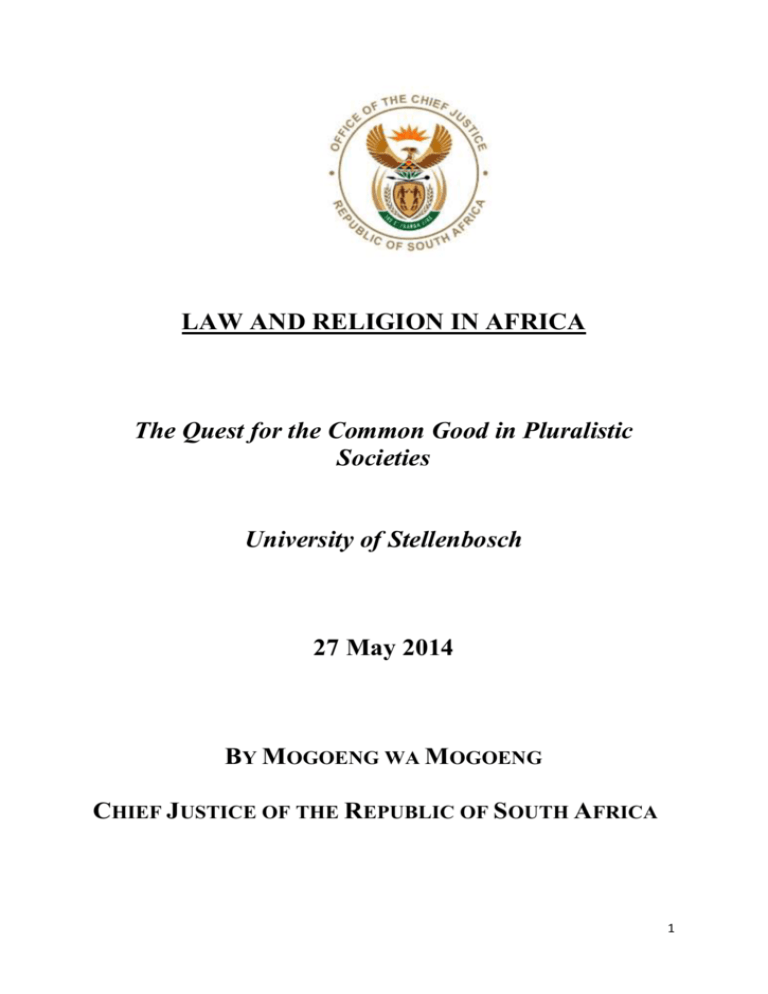
LAW AND RELIGION IN AFRICA The Quest for the Common Good in Pluralistic Societies University of Stellenbosch 27 May 2014 BY MOGOENG WA MOGOENG CHIEF JUSTICE OF THE REPUBLIC OF SOUTH AFRICA 1 Prof C S Human, Dean of the Faculty of Law, Prof N Koopman, Dean of the Faculty of Law, Members of the Organising Committee of this Conference, International guests, esteemed speakers, distinguished guests, ladies and gentlemen, I greet you. I wish to thank Prof Human, the University of Stellenbosch and the organisers of the Second Annual African Law and Religion Conference for extending the invitation to me to deliver a keynote address at this historic occasion. The theme of this Conference “Law and Religion in Africa: The Quest for the Common Good in pluralistic Societies”, is quite apposite in the light of the challenges we face as a continent, and the urgent need for all of us to contribute to the renaissance of Africa. Africa yearns for peace, stability, good governance, sustainable economic development and prosperity for all, now more than ever before. Several factors have an important role to play in facilitating the attainment of these noble objectives. Law and religion are some of those factors. The critical question that we are called upon to grapple with how the interplay between law and religion could yield a product that is for the common good of all in Africa’s pluralistic societies. The former President of the United States of America, Thomas Jefferson had this to say about religious tolerance: 2 I never will, by any word or act, bow to the shrine of intolerance, or admit a right of inquiry into the religious opinions of others.”1 Africa and her people must desist from worshipping the idol of religious and thought intolerance. And that is an essential ingredient to the renaissance of Africa. About the sanctity of religious freedom he said: The rights to religious freedom are of the natural rights of mankind and if any Act shall be passed to repeal an Act granting those rights or to narrow its operation, such Act will be an infringement of natural rights.”2 Laws must be enacted to advance and not to narrow the operation of, the right to freedom of religion. As you know, the intersection between religion and the law has been the subject-matter of some controversy for many years now. The resistance for allowing the legal content to be constantly fertilized by religion is understandable, although many could justifiably argue that it is based on a misapprehension of the true nature of religion and the treasures that religion generally has to offer in shaping a peaceful and prosperous society, a nation and a community of nations. 1 2 Thomas Jefferson, Letter to Edward Dowse, April 1803 Thomas Jefferson, Statute for Religious Freedom 1779, Papers 2: 546. 3 Some of the predicable objections to the influence of religion in shaping a legal and constitutional dispensation might be the potential marginalization of minority groups, that subscribe to other possibly less influential religions, those who do not subscribe to any religion, and those whose sexual orientation and philosophies of life are in direct conflict with the mainstream religions like Christianity, Judaism and Islam. Furthermore, there is a belief out there that religion has failed to keep pace with the developments of this new age and may therefore compromise the quality and speed with which programmes in several key areas of life or society must be driven. I believe that we can only become a better people if religion could be allowed to influence the laws that govern our daily lives starting with the Constitution of any county. I hope to support this conclusion with particular reference to principles drawn from the Christian faith. I do so, not because I have no regard for other religions, but because it is the only faith in which I have invested a lot of time and energy to familiarize myself with. It is the faith I subscribe to and can therefore articulate issues that relate to it, with a measure of authority. The levels of maladministration, crime and corruption, the extremely low levels to which morality has degenerated, the lackadaisical attitude of many government functionaries in the execution of their duties, the dishonesty as well as injustices that have permeated all facets of society, price-fixing and fronting 4 included, would in my view be effectively turned-around significantly, if religion were to be factored into the law-making process. More importantly, there is a strong correlation already, between law and religion. Religion is very important to many of us3. But, like any good thing, it is also open to abuse. As matter of fact, many have distorted religion and used it as the basis for the oppression of others. The law influenced by a dominant faith has at times been adulterated to serve as the tool for the extinction of smaller religions. In other jurisdictions, it is even an offence to subscribe to other faiths. Worse still, the death penalty is readily imposed on those who choose a religion other than the dominant one. We have witnessed large-scale killings, strife, socio-political instability, economic under-development, disregard for human rights and the rule of law and the consequential poor governance. They are at times given rise to by religious intolerance where the law has not been appropriately used to regulate the enjoyment of diverse faiths. Think about what is happening in the Central African Republic, Sudan, Nigeria, Mali, DRC Congo, Israel and Palestine. Religious intolerance is a significant factor in this sad state of affairs. 3 The importance of religion was captured by the Constitutional Court in Minister of Home Affairs v Fourie; Lesbian and Gay Equality Project v Minister of Home Affairs 2006 (1) SA 524at para 90 in the following terms: “Religion is not just a question of belief or doctrine. It is part of the people’s temper and culture, and for many believers a significant part of their way of life. Religious organisations constitute important sectors of national life and accordingly have aright to express themselves to governmentand thecourts on the great issues of the day. They are active participants in public affairs fully entitled to have their say with regard to the way law is made and applied.” 5 Before South Africa became a constitutional democracy, Christianity was adulterated and contorted by successive white regimes to achieve the evil objective of justifying the oppression of black people. Other religions like Islam, Buddhism and African religion, to mention but some, were marginalized to the point of not recognizing their marriages. Law and religion conspired to “justify” and enforce institutionalised wickedness and a crime against humanity known as apartheid. Not only were they synchronised to prohibit the sharing of the residential areas by different race groups, it was a serious act of immorality for a black person and a white person to love one another. That love was legislated against. Because this was not for the common good of all South Africans in our pluralistic society, strife and war ensued. Multitudes of black and white South Africans lost their lives, because law and religion were not allowed to serve their original and legitimate purpose, the common good of all4 They were corrupted. 4 Examples of this include the Prohibition of Mixed Marriages Act 55 of 1949 which prohibited marriages between couples from different race groups; the Immorality Amendment Act 21 of 1950; Sexual Offences Act 23 of 1957; the Group Areas Act 77 of 1957; and the Native Laws Amendment Act 36 of 1957 with the socalled church section (section 29(c)). According to this section, non-whites could be prohibited from attending church services in white areas. Later it was explained that the intention was not to prohibit bona fide church meetings as long as these meetings were not used to disturb the public order. The fact remains that religion and elements of the freedom of religion were controlled by the policies of the government. See Van Der Watt 1987: 84-86 and P Coertzen “Freedom of Religion in South Africa” Then and Now 1652 -2008. 6 Laws must be enacted with the full realization that religion is a matter of conscience and conviction. It cannot be imposed or legislated into the hearts and minds of the people. I believe that it is an appreciation of this reality, the decisive rejection of the suppression of other religions that moved South Africans to provide, not just in an Act of Parliament, but in our supreme law, for freedom of religion in these terms: “ 15 (1) Everyone has the right to freedom of conscience, religion, thought, belief and opinion” (2) Religions observances may be conducted at State or state-aided institutionsprovided that: (3) (a) those observances follow rules made by appropriate public authorities; (b) they are conducted on an equitable basis; and (c) attendance at them is free and voluntary. (a) This section does not prevent Legislation recognising – (i) marriages conducted under any tradition, or a system of religions of personal and family law’ or (ii) systems of personal and family law under any tradition, or adhered to by persons professing a particular religion. (b) Recognition in terms of paragraph(a) must be consistent with this section and the other provision of the Constitution.” 7 Additionally, section 9(3) of the Constitution provides that “the State may not unfairly discriminate directly or indirectly against anyone on one or more grounds, including . . . religion . . . .5 Our courts have expressed themselves on the significance of religion in the pluralistic society that we are. In S v Lawrence6 Chief Justice Chaskalson said: “The essence of the concept of freedom of religion is the right to entertain such religious beliefs as a person chooses, the right to declare religious beliefs openly and without fear of hindrance or reprisal, and the right to manifest religious belief by worship and practice or by teaching and dissemination.”7 From this definition, the Court laid it bare that freedom of religion in the South African context includes the right to express one’s belief publicly and to manifest that belief by worship and practice, teaching and dissemination. 5 See also section 31 of the Constitution which provides: “31. Cultural, religious and linguistic communities. (1) Persons belonging to a cultural, religious or linguistic community may not be denied the right, with other members of that community(a) to enjoy their culture, practise their religion and use their language; and (h) to form, join and maintain cultural, religious and linguistic associations and other organs of civil society. (2) The rights in subsection (1) may not be exercised in a manner inconsistent with any provision of the Bill of Rights.” 6 7 S v Lawrence; S v Negal; S v Solberg 1997 (4) SA 1176 (CC). Id at para 92 quoting Dickson CJC in R v Big M Drug Mart [1985] 1 SCR 295 at 336. 8 The pluralistic nature of the South African society was recognised in Prince in these terms: “The right to freedom of religion is especially important for our constitutional democracy which is based on human dignity, equality and freedom. Our society is diverse. It is comprised of men and women of different cultural, social, religious and linguistic backgrounds. Our Constitution recognises this diversity. This is apparent in the recognition of the different languages, the prohibition of discrimination on the grounds of, amongst other things, religion, ethnic and social origin; and the recognition of freedom of religion and worship. The protection of diversity is the hallmark of a free and open society. It is the recognition of the inherent dignity of all human beings. Freedom is an indispensable ingredient of human dignity. 8 The entrenchment of these rights in the Constitution marked a clear break from the repressive and biased policies of the past. It also served as a clear commitment to build a society that is tolerant of diversity. The drafters of our Constitution recognised that South Africa is a religiously plural society and aimed to protect our rights to belong to any religion without fear of being 8 Prince v President, Cape Law Society and Others 2002 (2) SA 794 at para 49. See also Christian Education South Africa v Minister of Education 2000 (4) SA 757 (CC) at para 36 where the Court said: “There can be no doubt that the right to freedom of religion, belief and opinion in an open and democratic society contemplated by the Constitution is important. The right to believe or not to believe, and to act or not to act according to his or her beliefs or non-beliefs, is one of the key ingredients of any person’s dignity. Yet freedom of religion goes beyond protecting the inviolability of the individual conscience. For many believers, their relationship with God or creation is central to all their activities. It concerns their capacity to relate in an intensely meaningful fashion to their sense of themselves, their community and their universe. For millions in all walks of life, religion provides support and nurture and a framework for individual and social stability and growth. Religious belief has the capacity to awake concepts of self-worth and human dignity which form the cornerstone of human rights. It affects the believer’s view of society and founds the distinction between right and wrong. It expresses itself in the affirmation and continuity of powerful traditions that frequently have an ancient character transcending historical epochs and national boundaries.” 9 discriminated against or persecuted. The entrenchment of this right in the Bill of Rights means that no law may be passed that militates against the exercise of the right of freedom of religion, conscience, thought and belief. Peace, stability, sustainable economic development, good governance and poverty eradication depend largely on the elimination of all factors known to be ordinarily instrumental to their absence. Alive to this reality, South Africans took a conscious decision to use the supreme law as the instrument that would create a platform for the peaceful co-existence of our people in our pluralistic society. South Africa has used the law commendably, to quench the centuries old quest to recognise the right of all our people to enjoy the fundamental right of freedom of religion, conscience, thought, belief and opinion. Hitherto unrecognised marriages and partnerships have since been recognised by section 15 (3) of our Constitution. That we do not have killings that are designed to promote any religion at the expense of the other, is largely due to the appropriate use of the law to regulate the enjoyment of all religions. It does not and should never matter how strongly opposed you are to the existence of a particular religion. All genuine religions must in law be left to co-exist with yours, for the common good of all. The creation of this constitutional possibility with a view to ensuring that all people 10 always feel at home in their own country, reduce unnecessary tensions and facilitate the enjoyment of freedom and diversity. In a democratic society comprising different religions or shades of the same religion, it may be necessary to impose constitutionally justifiable limitations on freedom of religion in order to reconcile the interests of the various groups and ensure that everyone’s religion, thoughts or beliefs are respected. After all, no right is absolute. That said, religion has a very important role to play in enriching and strengthening our laws to ensure that overall governance augurs well for the common good of all in our pluralistic societies. I believe that there are sound principles that cut across the religious divide which blend well with the existing legal architecture and philosophy that could further improve our legal systems. The relationship between law and religion was aptly captured by Lord Denning, a committed Christian himself, in the following words: “. . . They say law governs one’s dealing with one’s fellows, religion concerns one’s dealings with God, but the two are quite separate. Likewise they say the law has nothing to do with morality. It lays down rigid rules which must be obeyed without questioning whether they are right or wrong. Its function is to keep order, not to do justice. 11 . . . Although religion, laws and morals can be separated, they are nevertheless still very much dependent on each other. Without religion there can be no morality; and without morality there can be no law.”9 As we know all democratic orders rest on three pillars of government the Executive, Legislative and Judicial Branches although it is often made out to look like government rest on two. And the Bible says in Isaiah 33:22 that “ The Lord is our Judge, the Lord is our Lawgiver, the Lord is our King. He will save us”. Our safety and well-being as nations equally depends on the realisation and acceptance of the fact, that just as God the Father, God the Son and God the Holy Spirit are co-equal Personalities of the Trinity, so should the Executive, Legislative and Judicial Arms of the State be co-equal partners in the governance of any democratic country. None should unduly intrude in the terrain of the other, avoidable tensions should not be allowed to develop and institutional parity in relation to the allocation of resources, as well as the dignity with which members of each Arm are treated should be observed. The uncurbed dominance of one or some over the others or the other, is a recipe for undermining our constitutional democracies. Romans 13:1-3 implore us to “do that which is good”. Verse 7’s particularly striking. It says: 9 Lord Denning’s address delivered at the Annual Service in the Temple Church in October 1977. 12 “Render to all men their dues, pay taxes to whom taxes are due, revenue to whom revenue is due, respect to whom respect is due and honour to whom honour is due”. A vibrant partnership between law and religion would thus facilitate even revenue collection because religion touches every facet of life. And I want to believe that other religions also espouse equivalent principles in this and other respects discussed elsewhere in this paper. A great deal of benefit stands to be derived from a realisation of the profound similarity of purpose sought to be achieved, by religion and the law. The Constitution and pieces of legislation already in place generally bear a striking resemblance to Christian principles in many respects. The question should perhaps be, which other areas of the law could be enhanced to the benefit of all our people, by allowing religion to play a greater role than it has hitherto been allowed to play. To buttress my belief that there really cannot be laws in place, designed to advance the best interests of a nation, that run against the essence religion, I refer to Romans 13:8-10 which says: 13 “8. Owe no man any thing, but to love one another: for he that loveth another hats fulfilled the law. 9. For this, thou not shalt not commit adultery, thou shalt not kill, thou shalt not steal, thou shalt not bear false witness, thou shalt not covet and if there be any other commandment, it is briefly comprehended in this saying, namely, thou shalt love they neighbour as thyself. 10. love worketh no ill to his neighbour: therefore love is the fulfilling of the law.” If love is allowed to be foundational to the laws we enact and their enforcement is effective, then peace, stability and prosperity would be the inevitable long term outcome. If a way could be found to elevate the role of love and the sensible discouragement of divorce, through legal mechanisms, marital and family sanctity, and stability would be enhanced. A legal framework that frowns upon adultery, fornication, separation and divorce, subject to appropriate modification, would, idealistic as this may appear to be, help us curb the murders that flow from adultery, help us reduce the number of broken families and the consequential lost and bitter generation that seems to be on the rise, which in turn cause untold harm to society. Another biblical principle listed above that coincides with our legal framework is “thou shalt not kill”. But it is not enough to merely prohibit killing. Measures 14 must be in place to create an environment that is ‘hostile’ towards murder and militates against the existence of practices conducive to its commission. Theft is the semen that breeds fraud and corruption. The Bible forbids it and so does our common law. As in the case of all other prohibitions, the question that does not always seems to receive adequate attention and currency is, what systems do we establish and what widespread habits do we cultivate to eradicate the causes of theft, fraud, and corruption. Corruption is now endemic in our part of the world. Do we take advantage of the potency of religion to make the profound difference that it can make in sharpening the teeth of our legal instruments against corruption, or do we desist from doing so for fear of being accused of being either backward or fundamentalist? Perjury is an offence. It is on all fours with the above biblical injunction that ‘thou shalt not bear false witness ‘’. Additional biblical principles could be built into our daily living and broader legal landscape to render lying reprehensible, as a matter of practice. An unwavering commitment to the actualization of the nation building and reconciliation project and what is in the best interest of all our people must be made by all leaders and key opinion-makers in our continent. It must be in the form of an irrevocable vow, a covenant with the people. 15 That unbreakable undertaking is to be made in the form of an oath in the case of Christians. The oath is so powerful that to assure Abraham that He would surely bless Abraham as He was promising to do, God Himself said: “By myself I have sworn” (Genesis 22:16). The oath prescribed by our Constitutions and laws for senior government functionaries, is provided for in the Bible. You are not to mention the name of the Lord in vain. If you do punishment will ensue. (Exodus 20;7) An oath in the Name of God must be taken seriously or else. Law and religion blend so well in this regard. An understanding of the scriptural consequences of making promises and breaking them would help many to live up to their promises. All this can be done to benefit the nation and nations without undermining the rights of those who do not believe in anything. It takes a person of integrity to treat the oath with the seriousness it deserves. Our moral compass therefore needs to be serviced through some legal mechanism, such as scripture-based properly enforced ethical code of conduct, to facilitate adherence to the dictates of the oath. If States and all of us commit ourselves to respect each other’s religion and recognise and reconcile ourselves with the differences in our belief systems, most of the religious conflicts that have been plaguing our continent to the detriment of peace, stability and sustainable economic development would be a 16 thing of the past. We owe it to ourselves and posterity to speak and work against the cruelty that have been perpetrated over the centuries, in the name of religion. Many people have endured persecution for their beliefs by those who hold different beliefs and others have been forced to join other religions. Truly the ‘hallmark of an open and democratic society is its capacity to accommodate and manage differences of intensely-held world views and life styles in a reasonable and fair manner’.10 It bears emphasis, that the world we ought to strive to create is a ‘democratic, universalistic, caring and aspirationally egalitarian society which embraces everyone and accepts people for who they are irrespective of their religious beliefs’.11 This blends well with the Preamble to the South African Constitution which says: South Africa belongs to all who live in it, united in diversity. Religious freedom is indeed a bulwark against violent extremism. Failure to respect and entrench the culture of religious freedom could result in a climate of intolerance and impunity that emboldens those who ferment hatred and violence within ours societies. This is the best and only way of ensuring the common good of Africans in our pluralistic societies. I THANK YOU 10 Minister of Home Affairs v Fourie; Lesbian and Gay Equality Project v Minister of Home Affairs 2006 (1) SA 524 at para 95. 11 Id para 60. 17 18


